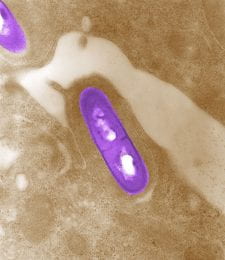
Photo: CDC
A recent food recall tied to deli meat and cheese has identified Listeria monocytogenes as the bacteria causing illness in 16 people and one death. So what is this bacteria?
Listeriosis is a serious infection caused by L. monocytogenes. It primarily affects pregnant women, newborns, older adults, and people with weakened immune systems.
In pregnant women, symptoms can be fever and flu-like symptoms. Infections have led to miscarriage, stillbirth, premature delivery, or life-threatening infection in the newborn. In other people, symptoms include headache, stiff neck, confusion, loss of balance, and convulsions.
Symptoms typically appear 1 to 4 weeks after eating a contaminated food and even up to 70 days after exposure.
Other associated foods include hot dogs, deli salads, unpasteurized dairy products and fresh fruits and vegetables. Prevention tips include cooking foods to safe temperatures, using pasteurized dairy products, preventing cross contamination and keeping surfaces and utensils clean.